| Listing 1 - 10 of 21 | << page >> |
Sort by
|
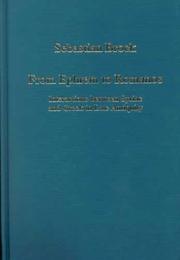
ISBN: 0860788008 9780860788003 Year: 1999 Volume: 664 Publisher: Aldershot (Great Britain): Ashgate,
Abstract | Keywords | Export | Availability | Bookmark
 Loading...
Loading...Choose an application
- Reference Manager
- EndNote
- RefWorks (Direct export to RefWorks)
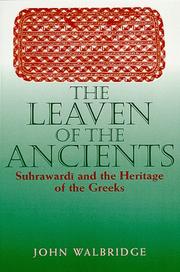
ISBN: 0791443590 0791443604 9780791443606 Year: 1999 Publisher: New York: State university of New York press,
Abstract | Keywords | Export | Availability | Bookmark
 Loading...
Loading...Choose an application
- Reference Manager
- EndNote
- RefWorks (Direct export to RefWorks)
The twelfth-century Persian philosopher Suhrawardi was the key figure in the transition of Islamic philosophy from the neo-Aristotelianism of Avicenna to the mystically oriented Islamic philosophy of later centuries. Suhrawardi's "Illuminationist" philosophy was a vigorous reassertion of Neoplatonism at a time when Sufism was becoming a major presence in Islamic thought and society. This book traces the intellectual background of Suhrawardi's thought and of the Greek roots of non-Aristotelian philosophy in the Islamic world. Suhrawardi placed himself in an intellectual tradition that sprang from the "Ancients," the philosophical and mystical tradition of Hermes Trismegistus and his successors in both Greece and the Orient. The author argues that Suhrawardi typifies an approach to philosophy characteristic of Neoplatonism, in which Pythagoras is the key pre-Socratic, Plato is the central figure in the history of philosophy, Aristotle is respected but corrected by reference to Pythagoras and Plato, and philosophy is ultimately an eclectic revelation known symbolically by different nations. Mystical intuition is a key philosophical tool and symbolism is of particular importance. The Leaven of the Ancients provides a translation of Suhrawardi's famous dream, in which Aristotle reveals the epistemological foundations of Suhrawardi's Illuminationist system. The book also analyzes the role played by Suhrawardi and his approach to philosophy in turning Islamic civilization away from physical science toward a subtle mystical psychology, thus offering a new explanation for the decline of science in Islam.
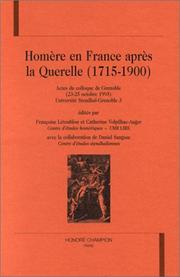
ISBN: 2745300687 9782745300683 Year: 1999 Volume: 32
Abstract | Keywords | Export | Availability | Bookmark
 Loading...
Loading...Choose an application
- Reference Manager
- EndNote
- RefWorks (Direct export to RefWorks)
Homer --- Congresses. --- Influence --- Congresses --- Appreciation --- Art [French ] --- Exhibitions --- Themes, motives --- 19th century --- French literature --- Greek influences
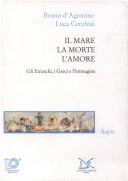
ISBN: 8879894900 Year: 1999 Publisher: Roma : Pæstum (Sa) : Donzelli ; Fondazione Pæstum,
Abstract | Keywords | Export | Availability | Bookmark
 Loading...
Loading...Choose an application
- Reference Manager
- EndNote
- RefWorks (Direct export to RefWorks)
Etruscans. --- Art, Etruscan --- Etrusques --- Art étrusque --- Greek influences --- Influences grecques
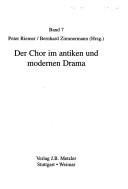
ISBN: 3476452107 Year: 1999 Publisher: Stuttgart : Metzler,
Abstract | Keywords | Export | Availability | Bookmark
 Loading...
Loading...Choose an application
- Reference Manager
- EndNote
- RefWorks (Direct export to RefWorks)
Classical drama --- Drama --- Greek drama --- History and criticism --- Chorus (Greek drama) --- Greek influences --- Appreciation
Book
Abstract | Keywords | Export | Availability | Bookmark
 Loading...
Loading...Choose an application
- Reference Manager
- EndNote
- RefWorks (Direct export to RefWorks)
Greeks --- Antiquities --- Magna Graecia (Italy) --- Italy --- Italy, Southern --- Civilization --- Greek influences
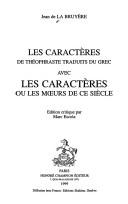
ISBN: 2745300849 9782745300843 Year: 1999 Volume: 17 Publisher: Paris: Champion,
Abstract | Keywords | Export | Availability | Bookmark
 Loading...
Loading...Choose an application
- Reference Manager
- EndNote
- RefWorks (Direct export to RefWorks)
Character sketches
---
French literature
---
Portraits (Littérature)
---
Littérature française
---
Criticism, textual
---
History and criticism
---
Greek influences
---
Critique textuelle
---
Histoire et critique
---
Influence grecque
---
#BIBC:ruil
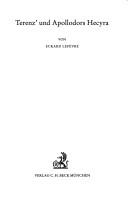
ISBN: 3406452434 9783406452437 Year: 1999 Volume: 101 Publisher: München: Beck,
Abstract | Keywords | Export | Availability | Bookmark
 Loading...
Loading...Choose an application
- Reference Manager
- EndNote
- RefWorks (Direct export to RefWorks)
Terence --- Apollodorus, --- Influence --- Latin drama (Comedy) --- Mothers-in-law in literature --- Greek influences --- -Latin drama --- Apollodorus of Carystus --- -Terence --- Afer, Publius Terentius --- Terentius, P. --- Afro, Publio Terencio --- Terenz --- Terentius Afer, Publius --- Terencjusz --- Terent︠s︡iĭ, Publiĭ --- Terencio --- Terencio Afro, Publio --- Terentios --- Terenzio Afro, Publio --- Terenzio --- Terentius Apher, Publius --- Apher, Publius Terentius --- טרנטיוס --- Mothers-in-law in literature. --- Greek influences. --- Terence. --- Influence. --- -Greek influences --- Latin drama --- Apollodor, --- Apollodoro, --- Latin drama (Comedy) - Greek influences

ISBN: 9781874774365 Year: 1999 Publisher: Liverpool : Liverpool university press,
Abstract | Keywords | Export | Availability | Bookmark
 Loading...
Loading...Choose an application
- Reference Manager
- EndNote
- RefWorks (Direct export to RefWorks)
Greeks --- Interfaith relations. --- Jews --- Judaism --- Judaism. --- Religion. --- Civilization --- Greek influences. --- History --- Historiography --- Relations --- Greek religion. --- Since 1750. --- Greece --- Greece.
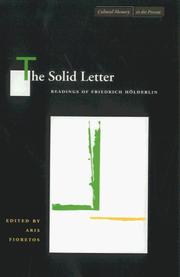
ISBN: 0804729433 Year: 1999 Publisher: Stanford (Calif.) : Stanford university press,
Abstract | Keywords | Export | Availability | Bookmark
 Loading...
Loading...Choose an application
- Reference Manager
- EndNote
- RefWorks (Direct export to RefWorks)
English poetry --- German literature --- Greek literature --- Hellenism. --- Modernism (Literature). --- Mythology, Greek, in literature. --- Romanticism. --- Greek influences. --- History and criticism. --- History and criticism --- Theory, etc.
| Listing 1 - 10 of 21 | << page >> |
Sort by
|

 Search
Search Feedback
Feedback About UniCat
About UniCat  Help
Help News
News